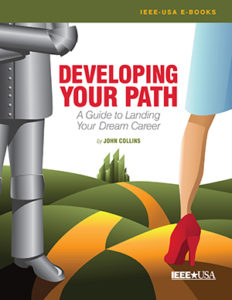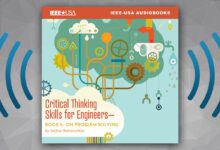
When John Collins says that working on cool technologies may be the best perk of all as an electrical engineer, he’s speaking from personal experience. Currently an engineering program manager at Snap, Inc., developers of social-media phenomenon Snapchat, he has also provided his expertise to helping create cutting-edge consumer electronics hardware at Microsoft and Apple.
|
Now Collins, an IEEE member, has written an e-book that deserves to be in the hands of not only engineering students, but also the many working professionals who are seeking to advance their careers. Developing Your Path – A Guide to Landing Your Dream Career is a cornucopia of solid, practical information. Topics range from choosing a college or university and the value of internships; to writing an effective resume; the interview process; and the importance of LinkedIn, the online business professionals’ network.
Collins has organized the material into 15 chapters. In “Choosing a College,” high school students can learn what he believes are the benefits of attending a top-tier institution. For example, the school has a world-class faculty, and you’re a known entity upon graduation. He also points out the potential drawbacks – tuition and associated costs are usually high; and teaching assistants or graduate students may teach the undergraduate classes – not the professors.
Other topics he covers in this chapter include ideas for managing the cost of a college education, the pros and cons of larger versus smaller academic institutions, and the importance of selecting an ABET-certified school.
The author devotes a chapter to a detailed examination of the different job sectors for engineers – highlighting the career advantages and disadvantages of each. He covers public and private sectors, large and small companies, and academia. Students should find much of the information enlightening and helpful in considering their professional pathways.
The chapter on “The Importance of Differentiation” analyzes what individuals can do to stand out from the crowd and get noticed. College students, says Collins, need to distinguish themselves with such extracurricular activities as the IEEE Student Chapter, writing for the school newspaper, or joining – or starting – a club.
“When you lead an organization,” he writes, you will learn how to manage without authority. You are not the manager of the other officers, and they are volunteering their free time; but you will learn to work around their priorities – an excellent skillset to take into the working world – and a strong differentiator for you.”
For engineers who are at early stages of their careers, or looking to expand their opportunities, the author recommends on-the-job training to open up new skill sets, or free online courses.
Collins devotes a substantial portion of the e-book to such major career factors as writing an effective resume, cover letters, and both the online application and interview processes. He acknowledges that while a resume is a person’s story of how they have advanced in their career, potential employers read the document only very briefly – and often upload it into job application databases. For a resume that both humans and computer algorithms can easily read, Collins recommends using a professional template from an online resource. He also provides examples of how to tailor bullet points, so they concisely and effectively convey the individual’s responsibilities and achievements. Other resume tips cover key information, length, format and references.
The author offers solid advice for engineers who apply for online opportunities. “The application process can be arduous,” he writes, “so try to make it as simple as possible. Have all the common information such as work history, contact details, etc., in a Microsoft Wood document so you can copy and paste quickly.” He also provides the names of apps and online job sites where the applicant creates a profile, views the job listings, and can apply – in just a few steps.
For both newcomers and those with job search experience, Collins explains how to navigate the multi-tiered interview process successfully, composed of both the telephone and in-person experience that many organizations use today. These include the initial phone interviews recruiters usually conduct, and he recommends the responses to have ready for specific questions. For the second phone interview, typically with the hiring manager, Collins suggests how to plot a successful course when discussing one’s technical background, as well as team experience, processes used, and other related information.
Collins’ advice is broad and deep about how candidates can handle positive in-person interviews. Whether discussing responses that emphasize how the candidate can benefit the company; how to dress; and what to order, if the meeting will include lunch (avoid pasta with messy sauces); the author has thought of virtually everything that can make or break this crucial interview phase.
The last two chapters of Developing You Path – A Guide to Landing Your Dream Career are valuable resources, although in different ways. “Understand the Compensation and Benefits Package” lists such various components of the package to be aware of as health care, employee stock purchase plans, and tuition reimbursement. In addition, one section clearly explains the workings of restricted stock units – a popular way for employers to compensate employees – with stock as part-payment for their employment.
Collins’ last chapter, simply titled “Extra Information,” is a collection of brief, but valuable, insights from the author. They include how to handle the first 90 days of a new job; deciding whether to pursue a Master’s degree; and the importance of regularly setting – and updating – goals.
Whether a high school student or recent graduate, an engineering student or working professional, this career guide is worth owning, reading – and rereading.
Developing You Path – A Guide to Landing Your Dream Career is available now for purchase for the member price of $2.99 and non-member price of $4.99.
Helen Horwitz is an award-winning freelance writer who lives in Albuquerque, N.M. She was with IEEE from 1991 through 2011, the first nine as Staff Director, IEEE Corporate Communications.

 Sneak Peak
Sneak Peak




